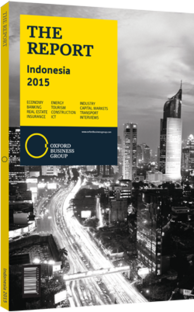Share analysis: Mitra Adiperkasa – retail
The Company
Mitra Adiperkasa (MAPI) claims itself as the number-one lifestyle retailer in Indonesia. As of 2014, MAPI had 1931 retail outlets located in 64 Indonesian cities, with a portfolio of over 150 international brands and 111 retail concepts. The company divides its business into four major segments: retail (clothes, sports and toys), department stores, cafés and restaurants, and others. The retail segment accounted for 63.4% of total revenue in 2014, while the department stores and cafés and restaurants segments contributed 22% and 13.1%, respectively. Profitability wise, the retail segment offered the highest operating margin in 2014 (6.6%), followed by others (3.4%), cafés and restaurants (1.2%) and department stores (0.1%). In 2014 MAPI introduced its new business blueprint for 2014-16, aiming to transform the company into “the leading omni-channel retailer in Indonesia with all-round improvement in revenue, profitability and shareholder value”.
MAPI sold its 51.0% stake in two loss-making restaurant businesses: Domino’s Pizza to Everstone Capital in 4Q 2014 and Burger King to QSR Indoburger in 1Q 2015. The result is eminent: the operating margin for the cafés and restaurants segment has turned positive, to +1.2% in 2014 and +5.5% in 1Q 2015, from -0.8% in 2013.
Development Strategy
MAPI’s past management experience has influenced the company’s decision to be more prudent in future store expansions, only supporting brands with high demand and high margins. We have appraised this decision below.
In our scenario, store space is set to increase by a CAGR of 7.9% in 2013-15, from 650,479 sq metres in 2013 to 757,979 sq metres in 2015, vs. an 18.3% CAGR in 2011-13. In April 2015, MAPI announced a plan to issue five-year unsecured zero-coupon bonds worth Rp1.5trn ($124m) by the middle of the year. The bond will be subscribed by Asia Sportswear, which is a subsidiary of CVC Capital Partners. MAPI intends to use the proceeds to repay its existing debt, resulting in a lower level of leverage from interest-bearing debt as well as future interest payments.
MAPI is also undertaking a strategic initiative to conduct an internal reorganisation, which includes spinning off its sports, golf, kids, lifestyle and payless businesses (under PT Putra Agung Lestari), as well as its garment manufacturing businesses (under PT Mitra Garindo Perkasa) into PT MAP Aktif Adiperkasa (MAA), its wholly-owned subsidiary.
This initiative will provide an opportunity for MAA to raise its own capital, including a future initial public offering (IPO) within the next four to five years. MAPI will also issue an option for 30% of the business under MAA, which will be mandatorily exercised by Montage Company (also a subsidiary of CVC Capital Partners) upon an IPO of MAA. Worth noting is that the retail segment (which will be under MAA) accounted for 64% of revenue and 95% of operating profit in 2014.
Forecast
We project net profit growth of 231.1% year-on-year (y-o-y) in FY2015, mainly because revenue is expected to increase by 17.6% y-o-y while the operating margin should improve from 4.4% in 2014 to 4.9% in 2015. This is due to store space growth of 9.3% y-o-y, positive turnaround in the performance of Galleries of Lafayette, a less aggressive discount strategy in the retail segment and divestment of Domino’s Pizza and Burger King. For 2016, we foresee MAPI net profit rising by 123.6% y-o-y.
At Rp5550 ($0.46) per share, the counter is trading at 38.0x P/E on a 2015E basis or only 16.7x on a 2016F basis. Regarding the issuance plan of Rp1.5trn ($124m) zero-coupon bonds, this may reduce company interest expense by some Rp150bn ($12.4m) annually, thus pushing down the rolling P/E to 30.8x on a 2015E basis or 12.7x on a 2016F basis. At the moment, we have not incorporated this scenario into our model. As a comparison, JAKCONS is now trading at a rolling P/E of 28.6x/24.9x on a 2015E/16F basis, while JAKTRAD is at 20.9x/17.6x.
You have reached the limit of premium articles you can view for free.
Choose from the options below to purchase print or digital editions of our Reports. You can also purchase a website subscription giving you unlimited access to all of our Reports online for 12 months.
If you have already purchased this Report or have a website subscription, please login to continue.

